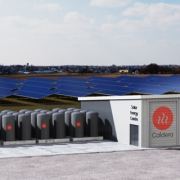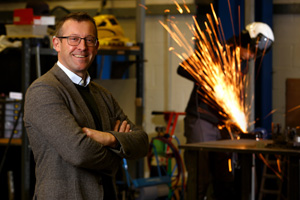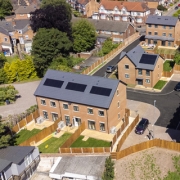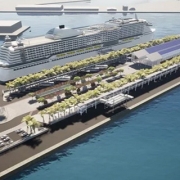RENOLIT ALKORPLAN AND BALTEN JOIN FORCES TO REDUCE WASTE WHILE WATERPROOFING THE TACO MOUNTAIN BASIN
BALTEN chose RENOLIT and its ALKORPLAN Hydro geomembrane for the re-waterproofing of the Taco Mountain basin (Tenerife). The project allowed to ensure irrigation without generating negative impacts on the territory: waste materials were recycled, thus significantly reducing CO2 emissions.
Sant Celoni, Barcelona, 14 September 2023 – Efficient rainwater collection is a crucial issue in the context of a more sustainable use of resources that are becoming increasingly scarce and discontinuous due to climate change, such as freshwater.
RENOLIT ALKORPLAN has joint forces with Balsas de Tenerife (BALTEN) to minimize the impact of the waterproofing works of the Taco Mountain basin. The project shows how RENOLIT ALKORPLAN Hydro geomembranes can be used to reduce water dispersion and material waste in basins even in challenging environments.
The challenge of rainwater collection in Tenerife
The Taco Mountain basin is built in the crater of a volcano and is the largest irrigation water reservoir on the island. The water is used almost exclusively to irrigate banana plantations, a key activity in the area. Located between the municipalities of Los Silos and Buenavista del Norte, it has a capacity of 821,739 cubic meters and a water height of 13.70 meters.
The bottom of the basin is characterized by an impermeable clay layer. However, the scarcity of rainwater on the island has led to the need to reduce the amount of water that disappears through the side walls of the basins. In addition, the site’s high exposure to solar radiation required the use of a highly UV-resistant material.
The conformity of the terrain makes the task even more challenging: the Canary Islands are characterized by a steep orography with abrasive aggregates and sharp edges. This leads to a greater need to optimize the capacity of reservoirs, requiring the design of basins with almost sub-vertical slopes in some cases.
CLICK HERE TO VIEW THE VIDEO

RENOLIT ALKORPLAN Hydro, a flexible and UV-resistant PVC-P geomembrane
To tackle these challenges BALTEN ̶ the public entity in charge of managing all water storage facilities on the island ̶ has chosen RENOLIT and its geomembrane ALKORPLAN Hydro 00414 R SST in 1,5 mm thickness for the project, for a total amount of 38,307 m2. The characteristics of the geomembrane allowed to carry out the job within the pre-established times, facilitating the implementation of the intervention.
RENOLIT produces geomembranes with very high performances. As installers, RENOLIT ALKORPLAN Hydro 00414 R SST offers relevant advantages to us, such as its high malleability and flexibility which make it suitable for applications in any scenario. As we implemented the project, the PVC geomembrane allowed us to weld over the old material, with the peace of mind that the welding was going to be perfect», explains Rubén Lopez, Managing Director of the installation company Imperteide.
RENOLIT ALKORPLAN Hydro 00414 R SST offers the right solution to meet all the requirements of the basin: made of flexible polyvinyl chloride (PVC-P), it is ideal for re-waterproofing applications as PVC can be welded even after many years. Flexible and resistant at the same time, RENOLIT ALKORPLAN Hydro 00414 R SST geomembrane is applicable on very steep slopes and with a protective layer against UV rays. In fact, the new geomembrane has Solar Shield technology, a special protective layer that reflects the sun’s rays and protects against microorganisms. This means that the membrane does not age as quickly. Emilio José Grande de Azpeitia, specifier of the project and head of Trazas Ingenieria, remarks that there is no other solution on the market that offers all these advantages at the same time, making it the perfect product for such extreme conditions like the Canary Islands’ ones.
Innovation meets sustainability
BALTEN trusted RENOLIT not only because of all the benefits RENOLIT ALKORPLAN Hydro 00414 R SST geomembranes offers and its extensive know-how in these applications, but also because of its commitment to sustainability.
Going into this project we had two main goals. First, the intervention was aimed at ensuring water supply to the island, limiting the inactivity of the basin to the shortest period. Secondly, we wanted to set an example as a public entity to also take on the consequences of the works. For this reason, we agreed with RENOLIT to collect the cutoffs in a waste-free manner and treat the PVC material with the same care as we treat water: without wasting a single ounce», says Fernando Bonnet, Head of Exploitation sector of BALTEN.
An additional challenge that RENOLIT has tackled without much difficulty. «We sent big bags to the site to collect the cutoffs and bring them to our factory. They will be recycled and converted in new raw materials to manufacture new membranes. In this way, we were able to reduce the amount of CO2 emitted by about 40% compared to landfilling», says Jennifer Witty Che, Sustainable Manager, RENOLIT.











 By aligning to the Prime Minister’s recently announced net zero approach, the proposed measures would not add additional burdens on households, but instead drive energy efficiency in a way that lowers household bills. This desire to have greener, more sustainable homes was even more in evidence among the next generation of home owners and buyers, with 66% of those surveyed aged between 18 and 30 saying it would be willing to pay more for an environmentally friendly home.
By aligning to the Prime Minister’s recently announced net zero approach, the proposed measures would not add additional burdens on households, but instead drive energy efficiency in a way that lowers household bills. This desire to have greener, more sustainable homes was even more in evidence among the next generation of home owners and buyers, with 66% of those surveyed aged between 18 and 30 saying it would be willing to pay more for an environmentally friendly home.
